mmaria
Been spending a lot of time on here!
- Joined
- Sep 4, 2013
- Messages
- 6,494
- Reaction score
- 2,991
- Location
- Wonderland
- Can others edit my Photos
- Photos OK to edit
When does a photographer exploit a person in order to get a good photograph?
When a photographer snap a street portrait f.e. of a happy person, it seems like no one sees that as an exploiting. When a photographer take a portrait or a scene with an homeless person or person a viewer can tell he/she lives in not so good conditions, then the answer become a bit complicated...
At least, that's happening to me.
They were there, hugging, kissing... waiting for me to take the shot, it seemed. I didn't think twice. I just wanted to capture them in the front of the Central Station in Brussels. I didn't think if that was appropriate to capture an intimate moment of some random strangers or not. It was a nice scene. If they noticed me, told me that they do mind their picture taken, I would back off. But they didn't and because of that, I have a nice shot. I do regret not approaching them and asking for their contact, to send them the picture. I was to insecure for that-didn't know will I produce a shot I could send them.
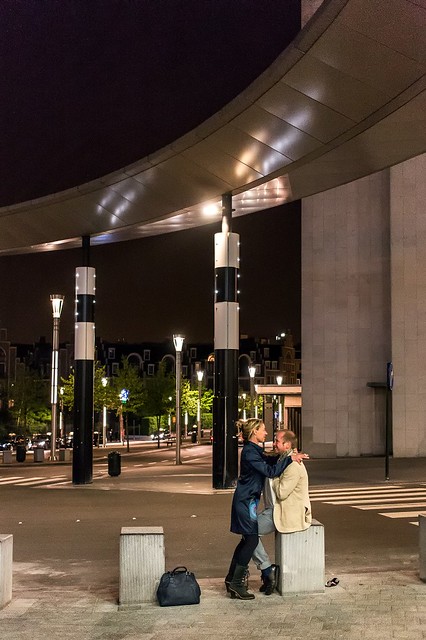
as a tourist, Central Station, Brussels by Sounds of Shutter
The other example could be this one...
My impressions, as a tourist there, in Grand Place, were: "What a beautiful place". Looking at those magnificent buildings, lots of tourist smiling, taking pictures, lots of happy people, lots of a nice energy... and then ... a reality check.
I saw him, I saw other people, I saw a scene and I wanted to shoot as soon as possible because I didn't want his face to be shown in the picture.
The thing is... I spent some time thinking is this right or is this wrong... Can I use him a s a subject? Is it ok for me to take a picture of him...
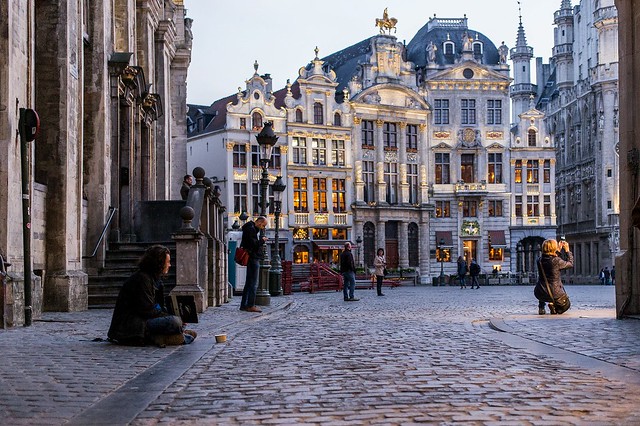
Grand Place, Brussels by Sounds of Shutter
The third example are some of the photographs I don't post.
I was in the subway and saw a great scene, a great example of fortunate-unfortunate people. I crouched and took a shot. The person saw me taking the shot and waved me not to do that. He did that in a most humble way and I felt soo wrong. I told him I didn't make it, I'm not showing the picture. I don't know if he understood English but I know I felt wrong.
Few months ago I shot some poor kids and families. With the most of the pictures I didn't have troubles thinking are they right or wrong. I had a task and I did my best to fulfill that task.
However... I was in the house with two kids and I shot them in their room. We laughed and we had a good time together. The mother came in the room and I asked to photograph her. She said ok. I placed her to sit on the bed, the kids were hiding on the other side of the bed. I stood on the chair and took a shoot from above. I wanted to capture her struggle... and I did. That is one of my most powerful pictures (according to me of course, because no one saw it)
I have her consent for the picture, but I couldn't publish the picture for the world to see. It felt wrong to show her struggle. She looked right to the camera and show a great amount of emotions in her eyes.
I have also a picture where she's smiling with her kids and I have no troubles to show the picture because it shows some happy feelings. It's a nice scene and a fine photograph. I don't feel I used her in any way in that picture. But for the one I described above, I do feel wrong because that picture shows how vulnerable she is...
Is this correct, that we tend not to call "exploiting" people (as photographers, and for the good shot) when they're happy or indifferent? But we do feel/think of exploiting/using them as a subject when they're shown in their bad/sad/vulnerable situation?
When a photographer snap a street portrait f.e. of a happy person, it seems like no one sees that as an exploiting. When a photographer take a portrait or a scene with an homeless person or person a viewer can tell he/she lives in not so good conditions, then the answer become a bit complicated...
At least, that's happening to me.
They were there, hugging, kissing... waiting for me to take the shot, it seemed. I didn't think twice. I just wanted to capture them in the front of the Central Station in Brussels. I didn't think if that was appropriate to capture an intimate moment of some random strangers or not. It was a nice scene. If they noticed me, told me that they do mind their picture taken, I would back off. But they didn't and because of that, I have a nice shot. I do regret not approaching them and asking for their contact, to send them the picture. I was to insecure for that-didn't know will I produce a shot I could send them.

as a tourist, Central Station, Brussels by Sounds of Shutter
The other example could be this one...
My impressions, as a tourist there, in Grand Place, were: "What a beautiful place". Looking at those magnificent buildings, lots of tourist smiling, taking pictures, lots of happy people, lots of a nice energy... and then ... a reality check.
I saw him, I saw other people, I saw a scene and I wanted to shoot as soon as possible because I didn't want his face to be shown in the picture.
The thing is... I spent some time thinking is this right or is this wrong... Can I use him a s a subject? Is it ok for me to take a picture of him...

Grand Place, Brussels by Sounds of Shutter
The third example are some of the photographs I don't post.
I was in the subway and saw a great scene, a great example of fortunate-unfortunate people. I crouched and took a shot. The person saw me taking the shot and waved me not to do that. He did that in a most humble way and I felt soo wrong. I told him I didn't make it, I'm not showing the picture. I don't know if he understood English but I know I felt wrong.
Few months ago I shot some poor kids and families. With the most of the pictures I didn't have troubles thinking are they right or wrong. I had a task and I did my best to fulfill that task.
However... I was in the house with two kids and I shot them in their room. We laughed and we had a good time together. The mother came in the room and I asked to photograph her. She said ok. I placed her to sit on the bed, the kids were hiding on the other side of the bed. I stood on the chair and took a shoot from above. I wanted to capture her struggle... and I did. That is one of my most powerful pictures (according to me of course, because no one saw it)
I have her consent for the picture, but I couldn't publish the picture for the world to see. It felt wrong to show her struggle. She looked right to the camera and show a great amount of emotions in her eyes.
I have also a picture where she's smiling with her kids and I have no troubles to show the picture because it shows some happy feelings. It's a nice scene and a fine photograph. I don't feel I used her in any way in that picture. But for the one I described above, I do feel wrong because that picture shows how vulnerable she is...
Is this correct, that we tend not to call "exploiting" people (as photographers, and for the good shot) when they're happy or indifferent? But we do feel/think of exploiting/using them as a subject when they're shown in their bad/sad/vulnerable situation?



![[No title]](/data/xfmg/thumbnail/37/37488-1946adf246ec6e047915c668d3dcff15.jpg?1619738111)
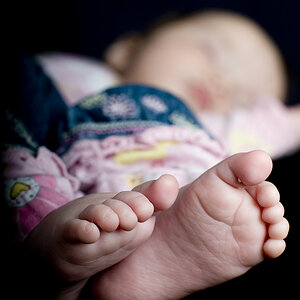
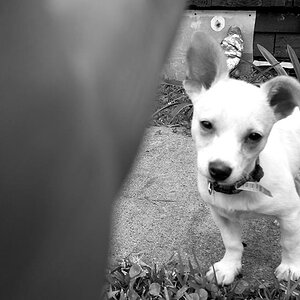
![[No title]](/data/xfmg/thumbnail/32/32702-7344d6e6132276dd7bfc046084fea432.jpg?1619735604)
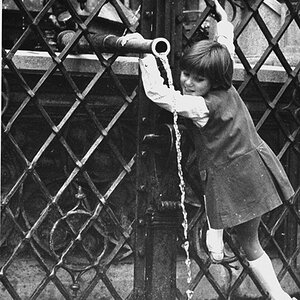
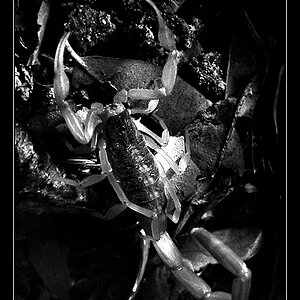
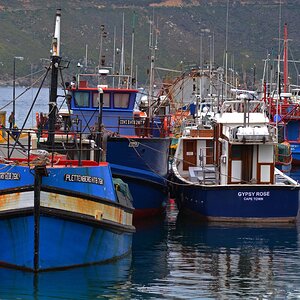
![[No title]](/data/xfmg/thumbnail/32/32706-50b778fbc110c8ea4472547d54c6a923.jpg?1619735610)
![[No title]](/data/xfmg/thumbnail/37/37658-89245697846ece2c4ecbce304510699b.jpg?1619738173)

![[No title]](/data/xfmg/thumbnail/37/37659-7302b7a4f9ae50a952748e8b395695fe.jpg?1619738174)